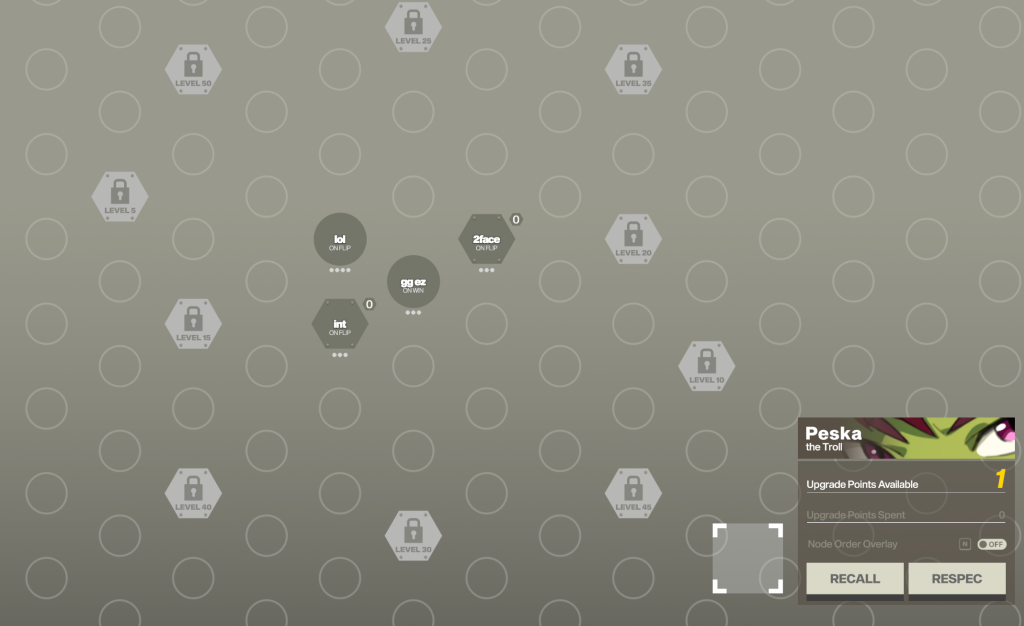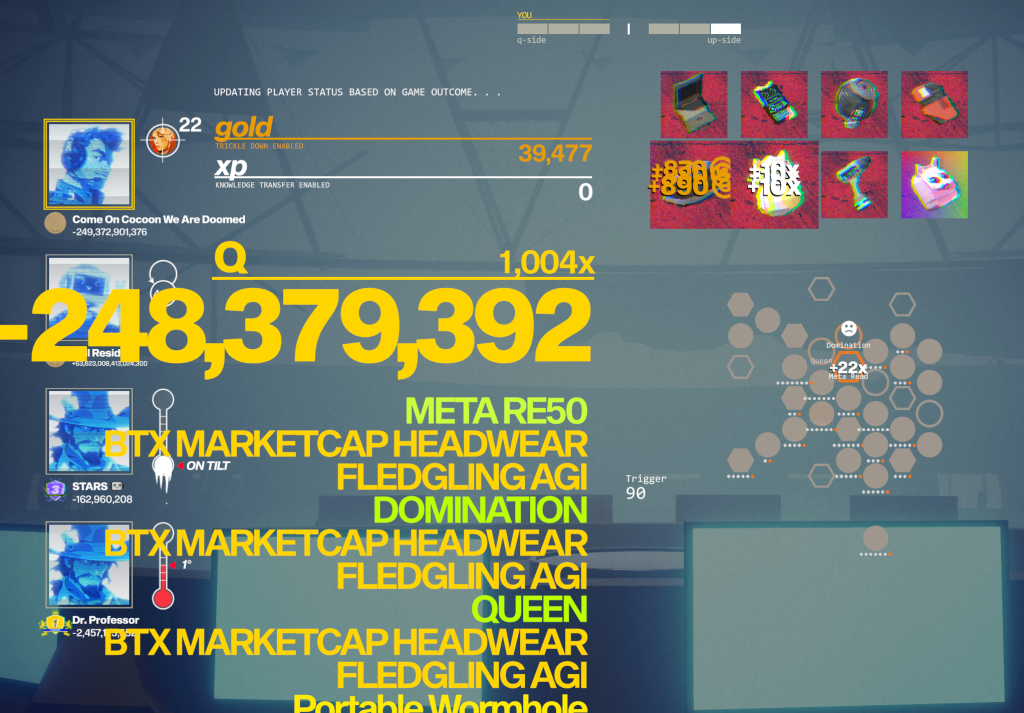Q-Up is a lot of different things. It’s a incremental game. It’s a competitive coin-flipping eSport. It’s a weird satire of live service games and tech startups. Oh, and it has a really cool grid based node engine building system, and slightly less interesting, but still compelling item system. Finally, it’s a game that I feel weirdly conflicted about.
Before I go any further, I want to note that I do recommend Q-Up. It’s a weird one, but if you like incremental games/engine building experiences, and enjoy strangeness, you’ll probably have a good time. And if you’re on the fence because of that “incremental game” element, Q-Up generally respects the player’s time. It took me about 6.5 hours to reach the “end” of the game, and I suspect it would have been closer to the expected 8-10 hours if I hadn’t played a lot of the demo to get familiar with mechanics beforehand.
If you’re the sort of person who really loves incremental games… well, there are some absolutely busted end-game builds, and semi-competitive ladders, and the folks on the game’s discord seem to be having a good time.
A lot of what I’m going to be talking about here, I already covered in my writeup on Q-Up’s demo. If you want a spoiler free discussion of the game, I suggest you go read that instead.
Q-Side
The premise of Q-Up is simple: it’s the hottest new competitive game on the market. Games are 4v4, and after queuing up, and getting placed in a match, you’ll either be put on Q-Side or Up-Side. A coin will be flipped. If it lands on Q, Q-Side team gets a point. If it lands on Up, Upside team gets a point. First team to 3 points wins.
And yes, this does mean that you as a player have zero agency over who wins or loses any given game of Q-Up. That’s the point. Something something comedy, something something frog.
But just because you can’t influence the outcome doesn’t mean you can’t change the results. After all, it’s not about winning or losing. It’s about getting as much stuff as possible.
Oh The Stuff You Can Get
Q-Up has four main resources: Q, experience, gold, and gems. Lets start with Q.
After each flip in match, you’ll gain or lose Q. Winning the flip starts you out with a positive amount of Q, losing with a negative amount. Q determines your rank, with higher ranks giving more Q, and lower ranks give less.

This amount, however, will be adjusted by your character’s skills and items, which is as good a place as any to talk about experience and gold.

Experience points are… experience points. You get enough of them, you level up. When you level up, you unlock skills and skill points to use on the skill grid.
This is the engine building part of Q-Up. The skill grid is a set of interconnected trigger-able nodes. Nodes can trigger when you win, lose, or always. They can do a variety of things, including triggering other nodes. Nodes also have activation stock: a maximum number of times that they can be triggered during a given flip.

It’s a very fun and unique system, with each of the game’s eight characters having their own nodes and builds. Some want high numbers of combos, others generate Q by spending gold, or clone items.
Which brings us to gold and items. There’s a shop, you buy items in it. Then you equip those items.


They’re mechanically impactful, and very functional, but there’s nothing here that makes it different from any other item shop.
Which means it’s time to talk about gems! You get gems by ranking up, and recycling unwanted items. They’re used to unlock meta-progression-y style stuff, like the ability to stop shop items from rotating out, and extra item slots, and other things.
And this is the core loop of Q-Up. Play a match, get resources. Spend those resources to improve your build. Rinse, repeat. Often, in the middle to late portions of the game, that’ll involve reworking your build to generate a specific resource you might want, such as gems or experience points, or tweaking to maximize getting as much Q as possible.
So I’ve talked about the mechanics. I’ve talked about the theme. Which leaves the narrative.
Narrative
From here on out we’re talking spoilers. If you want to play Q-Up, this is a good time to leave.
Q-Up trades in a lot of different fields/themes. Fortunately for me, I think I recognize most of them, as they’re related to my job and interests.
This narrative starts out as one poking fun at what I’d generally group as “Live Service Games”, perhaps more specifically the “single match” live service game. League of Legends, Dota 2, Valorant, CS:GO, that sort of thing. This is where the game stays mechanically, but narratively, it’s going to become Mr. Toad’s Wild Ride real fast.

I can’t think of a better way to dissect the narrative and the struggles I had with it, without laying the full structure, so here we go.
After you start playing Q-Up, at some point you’ll either get a 3-0 loss, or 0-3 win. This introduces you to Alice and Bob. Alice is the head of a quantum computing company and Bob is the head of the company running Q-Up. Alice and Bob are at least somewhat fighting over the company Bob is running.
This opens the second part of narrative, which is mostly about conflict between Alice and Bob. Notably, it’s also not told in any straightforward way, and most of the information you get given is filtered through the lens of “You just joined this project, and everyone is using terms you don’t understand, and acronyms no one’s explained” sort of energy.
Fortunately, I work in a tech company. I have LIVED this exact experience. Multiple times. So again, I was pretty in my element for this bit.

Anyway, this culminates with Alice attempting a hostile takeover, and Bob using you, the player, to stop it by proving that Q-Up is a game of skill, and not a game of gambling. You enter the Q-Up championships, and attempt to win your way to novice rank.
Then things get odd.
I have a hard time summarizing what exactly happens next, because I’m pretty sure this is where the game starts playing around in the space of Information Theory. I don’t know anything about Information Theory.
Anyway, after you get banned from Q-Up by Alice, a sentient artificial intelligence intervenes in order to get you unbanned, and also to use you to free itself. At the same time, the server room for running Q-Up seems to start to collapse, because… again. I think something Information Theory related.
This leads to the finale of the game, where a pair of cosmic intelligences attempt to restart the universe.
It’s this last tenth or so of the game where Q-Up completely lost me. Not because it was bad, but more so because I was just incredibly confused. The sentient AI part is mostly fine, and foreshadowed pretty hard, but it’s also not really paid off to the extent I would like. The same is true of the cosmic intelligences. To me, they just come out of absolutely nowhere, but I suspect that the writers may be trading in themes or ideas that I’m simply not familiar with.
It left an unpleasant taste in my mouth, because the rest of the game is actually fairly interesting. I was much more invested in Alice and Bob of all things than I was in any of the “wacky hijinks” at the end. And in the last moments of the game, that story got pushed to the wayside for cosmic strangeness.
It also doesn’t help that this last section of the game feels very short and sudden. Things are escalating, escalating, getting exciting… and then it’s all over.
Putting on the introspective critic hat for a moment
Given that Q-Up is already trading in a bunch of specific themes in its aesthetic and narrative, I think that what is actually happening here is that I am just out of the loop for the joke. This last portion of the game probably isn’t “random wacky hijinks,” but is instead Who’s On First for quantum computing or information theory, or perhaps some third thing I’m completely unaware of.
Maximum insider baseball that I am no longer an insider for.
But it was incredibly jarring, because I had been an insider for the rest of it, and the result was that a narrative I cared about, that I was curious and excited about, suddenly felt like it pulled a Fish Guys.
It just left me feeling really weird about a game that I had, until that point, really enjoyed.
Hat is off, back to final thoughts
I like 90% of Q-Up. I like its mechanics, I love the theming and UI, and I love most of the story.
It’s the suddenness with which the story ends that really bummed me out more than the weirdness, if I’m being honest. Everything felt like it wrapped up too quickly. Q-Up is not a very long game narrative. The majority of the game takes place across 70 or so emails, and the finale across another 30. And that’s probably overcounting a bit.
Q-Up was $9. I think I got my money’s worth. But I wish I felt different about the ending.
I wish I could call the game a masterpiece, instead of just very good.
P.S. This is not my finest write-up. If it feels stitched together, that’s because, well, it is. I wrote 3-4 different versions of this, and none of them were exactly what I wanted. So instead, you get this mess. Sorry about that.
Have some gems.

Also.


